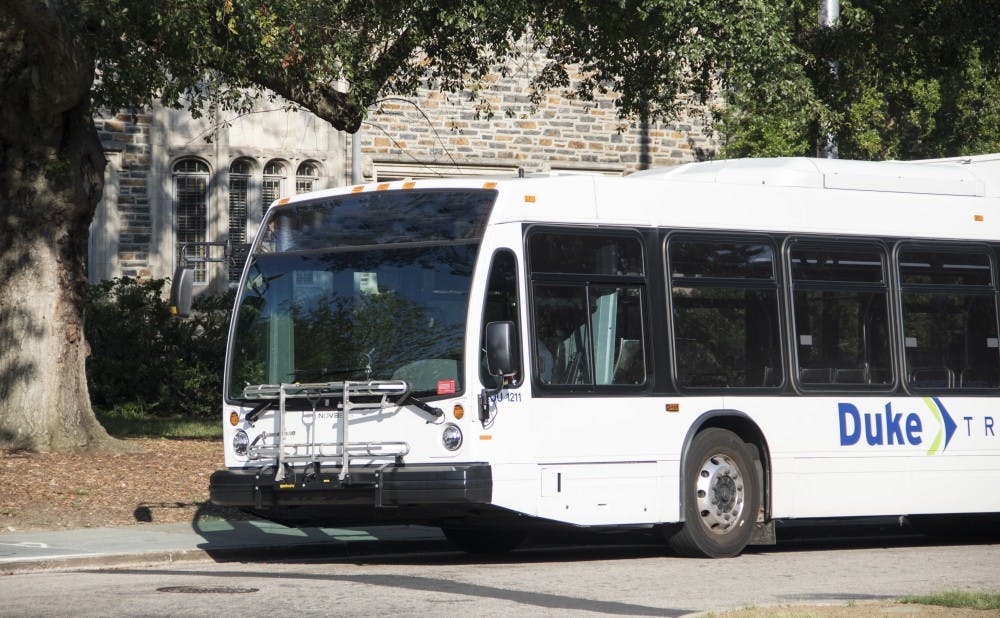When Duke closed its campus last March due to the pandemic, Erika Jenkins, a year-round University bus driver for over 15 years, was laid off.
According to Jenkins, Duke Transit management said she could file for unemployment benefits, so she filed an unemployment claim with the North Carolina Division of Employment Security (DES). Two months later, she was surprised to find out that her claim was denied.
Before unemployment benefits can be issued, DES verifies the claimant’s information through a request for separation information form sent to the employer. A DES agent informed Jenkins that the information provided by Duke claimed she only worked when school was in session, not year-round, causing her claim to be denied, according to Jenkins.
Duke Transit did not respond to a request for comment.
After more than a year, Jenkins, along with another year-round bus driver, Mark Mcdaniel, said that they still haven’t received several thousand dollars in benefits, even though most of their fellow bus drivers have.
“We’re all doing the same jobs, but you have people that have been there less than five years and they received [unemployment benefits],” said Demoncio Akins, a Duke bus driver who did receive his unemployment benefits and is assisting Jenkins and Mcdaniel. “You’re talking about these veterans, and they haven’t been able to receive it. It makes no sense. It was an error that Duke made that caused this in the first place.”
Charles Kyles, director of Duke Workers’ Compensation, recommended that Jenkins appeal the determination through DES and said that Duke would not oppose her appeal in a hearing, according to a July 2020 email obtained by The Chronicle. Following Kyles’ email, Jenkins filed her appeal of denied benefits to DES in July.
In September, Jenkins called Tommy Cocke, an unemployment specialist at Duke Workers’ Compensation, to ask if Duke could file another separation information form reflecting her year-round employment status. Cocke said he couldn’t discuss the matter with her.
The Chronicle reached out to Kyles and Cocke for comment. Cocke referred The Chronicle to Kyles, who did not respond directly. Paul Grantham, assistant vice president of Duke’s Office of Communication Services, responded on Kyles’ behalf.
Jenkins waited eight months for her appeal hearing in March 2021, during which Duke opposed her appeal, according to Akins. She lost the hearing and collected no benefits.
Jenkins then filed a higher authority appeal, which is overseen by the North Carolina Board of Review. According to Akins, they have not heard back from the Board.
“While the decision on the claim is at the sole discretion of the N.C. Department of Commerce Board of Review, Duke has notified the Board to indicate our support for [Jenkins’] claim for unemployment based on the work time lost,” Grantham wrote in an email.
According to Grantham, the Board said that a decision is forthcoming.
Mcdaniel said he filed his appeal in June 2020. He said DES kept changing the date of his hearing because they couldn’t find his appeal. In June 2021, they finalized his hearing date for later in the month.
Jenkins’s and Mcdaniel’s appeals are two of the tens of thousands that were delayed due to the pandemic and increase in unemployment claims. Before the pandemic, an appeal would have been heard within 20 days. According to the DES website, current hearing dates are scheduled for three or more months after the date DES receives the appeal.
“The sad thing is they shouldn’t be appealing anything. They should just be compensated the unemployment benefits,” Akins said. “For them to go through this is disgraceful and shameful.”
Jenkins had no income until she went back to work in August when campus opened back up. She had just paid for a surgery before the pandemic, and after being laid off, she lost her car and her credit fell “all the way back down to where it was when I was a teenager,” she said. “My credit has never been that bad.”
“It adds insult to injury after going through COVID-19, the strengths of that, trying to figure out how to be safe, and then all of a sudden now you’re slapped with, ‘Oh by the way, even though we’re saying that we’re going to give you unemployment compensation for being out, we’re not going to,’” Akins said.
Even though Jenkins and Mcdaniel are working again, they said they aren’t working as much as they used to.
“All [Duke] had to do is do the correct paperwork,” Mcdaniel said. “If they had done the correct paperwork, we would not be at this point. They can do better, so that’s why we’re going to fight until we can get something done.”
Get The Chronicle straight to your inbox
Signup for our weekly newsletter. Cancel at any time.

Milla Surjadi is a Trinity junior and a diversity, equity and inclusion coordinator of The Chronicle's 119th volume. She was previously editor-in-chief for Volume 118.

